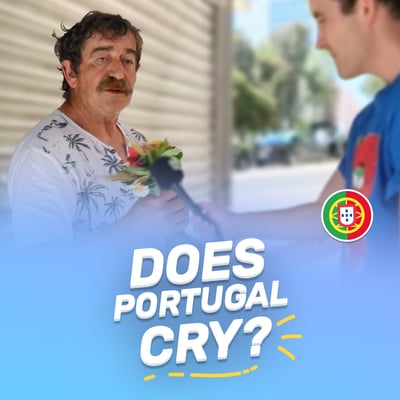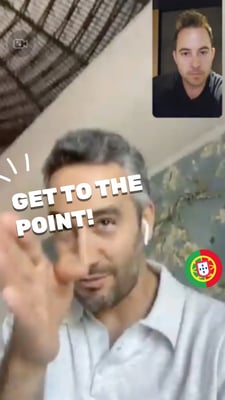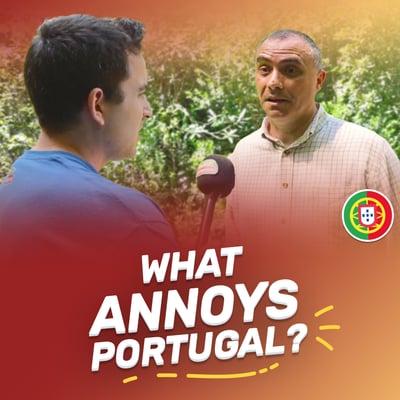1
00:00:01,875 –> 00:00:02,375
J: Bom dia.
{{J: Good morning.}}
2
00:00:02,375 –> 00:00:03,167
Sra: Bom dia.
{{Lady: Good morning.}}
3
00:00:03,167 –> 00:00:04,750
Que giro…
{{How cute…}}
4
00:00:06,083 –> 00:00:08,333
Olha, era bem mais rápido.
{{Look, it would be so much faster.}}
5
00:00:08,333 –> 00:00:09,750
Sra: Pois é, chegavam mais rápido.
{{Lady: That’s true, you’d get there faster.}}
6
00:00:09,750 –> 00:00:10,750
R: Pois era.
{{R: We would.}}
7
00:00:10,750 –> 00:00:17,083
Este é o nosso segundo dia. Já tomámos o pequeno-almoço, ali em Vilarinho.
{{This is our second day. We already had breakfast, there in Vilarinho.}}
8
00:00:17,083 –> 00:00:19,458
Já caminhámos cerca de um quilómetro e meio.
{{We already walked about 1.5 kilometers.}}
9
00:00:19,458 –> 00:00:21,458
Também vai para Santiago?
{{Are you also going to Santiago?}}
10
00:00:23,125 –> 00:00:24,458
Sra: Boa viagem!
{{Lady: Have a good trip!}}
11
00:00:24,458 –> 00:00:30,500
R: O pequeno-almoço foi simples, café com sandes mista.
{{R: Breakfast was simple, coffee and a ham and cheese sandwich.}}
12
00:00:30,500 –> 00:00:35,500
E o Joel, que já não bebe café, bebeu um sumo.
{{And Joel, who no longer drinks coffee, had juice.}}
13
00:00:35,500 –> 00:00:43,500
E agora estamos ao pé deste portão, desta entrada, e deixámos a estrada, finalmente.
{{And now we’re next to this gate, this entrance, and we left the highway, finally.}}
14
00:00:43,500 –> 00:00:46,792
Já não temos carros e camiões a passar.
{{We no longer have cars and trucks passing by.}}
15
00:00:46,792 –> 00:00:52,208
Já não corremos perigo de vida. E agora, o caminho é bem mais bonito. Queres mostrar, Joel?
{{Our lives are no longer in danger. And now, the Caminho is much more beautiful. Do you want to show, Joel?}}
16
00:00:55,000 –> 00:00:59,375
Já temos algumas bolhas, mas nada de grave.
{{We already have a few blisters, but nothing serious.}}
17
00:00:59,375 –> 00:01:02,958
Já tratámos disso à noite e vamos continuar.
{{We took care of that at night and we’re going to keep going.}}
18
00:01:02,958 –> 00:01:09,708
Só queríamos mostrar aqui este arco, este género de portão, e continuar.
{{We just wanted to show this arch over here, this sort of gate, and then continue.}}
19
00:01:28,833 –> 00:01:31,333
Oh, dois quilómetros!
{{Oh, two kilometers!}}
20
00:01:31,333 –> 00:01:34,917
A senhora que mora no meu telemóvel acabou de dizer.
{{The lady who lives in my cellphone just said so.}}
21
00:01:35,542 –> 00:01:41,458
Completámos agora dois quilómetros e agora eu sinto que estamos no Caminho,
{{We just completed 2 km and now I feel that we’re on the Caminho,}}
22
00:01:41,458 –> 00:01:46,875
com estas paredes de pedra, sem carros, calçada…
{{with these stone walls, no cars, this pavement…}}
23
00:01:46,875 –> 00:01:53,458
Saímos da zona da Vila do Conde e estamos a caminho de Barcelos.
{{We left Vila do Conde and we’re on our way to Barcelos.}}
24
00:01:53,458 –> 00:01:58,833
E, por acaso, nós temos um episódio sobre o galo de Barcelos, a contar a história.
{{And we actually have an episode about the rooster of Barcelos, telling that story.}}
25
00:02:00,125 –> 00:02:07,167
“A história passou-se em Barcelos, uma cidade do norte de Portugal por volta do século XVI.
{{“The story happened in Barcelos, a city in the north of Portugal, around the 16th century.}}
26
00:02:07,167 –> 00:02:14,458
A população andava assustada com um crime cujo culpado ainda não tinha sido descoberto.”
{{The population was frightened due to a crime whose perpetrator hadn’t been found yet.”}}
27
00:02:18,375 –> 00:02:20,125
Bom dia!
{{Good morning!}}
28
00:02:20,125 –> 00:02:24,208
Olá! Olhe, eu e este menino do Canadá, que é o Joel…
{{Hi! Look, me and this Canadian guy, Joel…}}
29
00:02:24,250 –> 00:02:24,958
Sra: Sim?
{{Lady: Yes?}}
30
00:02:24,958 –> 00:02:28,292
R: Nós temos um projeto em Lisboa que é para ensinar português aos estrangeiros.
{{R: We’ve got a project in Lisbon to teach Portuguese to foreigners.}}
31
00:02:28,292 –> 00:02:29,250
Sra: Acho muito bem.
{{Lady: I think that’s very good.}}
32
00:02:29,250 –> 00:02:30,708
R: A senhora já foi a Santiago?
{{R: Have you been to Santiago?}}
33
00:02:30,708 –> 00:02:31,875
Sra: Já fui de carro.
{{Lady: I have, by car.}}
34
00:02:31,875 –> 00:02:32,500
R: De carro.
{{R: By car.}}
35
00:02:32,500 –> 00:02:33,250
Sra: Várias vezes.
{{Lady: Several times.}}
36
00:02:33,250 –> 00:02:33,875
R: É bonito?
{{R: Is it beautiful?}}
37
00:02:33,875 –> 00:02:35,417
Sra: É muito bonito. Não conhece?
{{Lady: It’s very beautiful. Don’t you know it?}}
38
00:02:35,417 –> 00:02:36,750
R: Não, é a primeira vez que vamos.
{{R: No, it’s our first time going there.}}
39
00:02:36,792 –> 00:02:40,042
Sra: É muito bonito, Santiago. É muito agradável.
{{Lady: It’s very beautiful, Santiago. Very pleasant.}}
40
00:02:40,042 –> 00:02:43,083
R: Acha que a língua portuguesa é complicada para os estrangeiros aprenderem?
{{R: Do you think the Portuguese language is complicated for foreigners to learn?}}
41
00:02:43,083 –> 00:02:46,333
Sra: Sim, talvez um bocadinho complicada.
{{Lady: Yes, it might be a bit complicated.}}
42
00:02:46,333 –> 00:02:51,875
Mas com exercício… Para nós, o inglês, o alemão, também é difícil.
{{But with practice… For us, English, German, those are also difficult.}}
43
00:02:51,875 –> 00:02:53,167
R: Pois, é difícil, é.
{{R: Yes, yes, it’s difficult.}}
44
00:02:53,167 –> 00:02:55,000
As meninas já estão a aprender inglês?
{{Are the girls already learning English?}}
45
00:02:55,000 –> 00:02:56,667
Menina: Eu já, já aprendi alguma coisinha.
{{Girl: I have, I’ve already learned some things.}}
46
00:02:56,667 –> 00:02:58,333
R: Já? Diz lá uma palavra.
{{R: You have? Go ahead and say a word.}}
47
00:02:59,792 –> 00:03:02,000
Diz lá. Tem vergonha.
{{Go on. She’s embarrassed.}}
48
00:03:02,000 –> 00:03:03,833
Sra: “Como está?”, como é que se diz, hã?
{{Lady: “Como está?”, how do you say that, huh?}}
49
00:03:05,750 –> 00:03:06,917
Mna: Não me lembro.
{{Girl: I don’t remember.}}
50
00:03:06,917 –> 00:03:08,833
R: E como é que se diz “Olá”?
{{R: And how do you say “Olá”?}}
51
00:03:10,667 –> 00:03:12,833
Sra: Como é que se diz “Obrigada”?
{{Lady: How do you say “Obrigada”?}}
52
00:03:12,833 –> 00:03:14,250
Mna: Sei lá!
{{Girl: I don’t know!}}
53
00:03:14,250 –> 00:03:17,333
R: Tu sabes! Já tem vergonha. Olhe, mas a senhora sabe!
{{R: You know it! She’s already embarrassed. But look, you know it, ma’am!}}
54
00:03:17,333 –> 00:03:20,375
Sra: Sei um bocadinho. Eu tenho uma filha na América.
{{Lady: I know a little. I have a daughter in America.}}
55
00:03:21,500 –> 00:03:25,417
R: Nós temos ali… Um dos nossos amigos, que já vai ali à frente, é americano.
{{R: We have one… One of our friends, who’s already over there, is American.}}
56
00:03:25,417 –> 00:03:28,708
Sra: Tenho uma filha na América, está na universidade de Harvard.
{{Lady: I have a daughter in America, she’s in Harvard.}}
57
00:03:28,708 –> 00:03:30,458
R: Olha, boa!
{{R: Oh, great!}}
58
00:03:30,458 –> 00:03:31,958
R: E a senhora mora aqui.
{{R: And you live here.}}
59
00:03:31,958 –> 00:03:33,667
Sra: Eu moro aqui, naquela casa ali.
{{Lady: I live here, in that house over there.}}
60
00:03:33,667 –> 00:03:34,333
R: Que giro.
{{R: How nice.}}
61
00:03:34,333 –> 00:03:38,542
Sra: E ela fez… Foi lá fazer doutoramento e agora está a fazer postdoc.
{{Lady: And she did… She went there for her Ph.D. and she’s doing her postdoc now.}}
62
00:03:38,542 –> 00:03:39,833
R: Postdoc.
{{R: Postdoc.}}
63
00:03:39,833 –> 00:03:41,583
Mna: Mas eu não moro, eu moro em Vila do Conde.
{{Girl: But I don’t live there, I live in Vila do Conde.}}
64
00:03:41,625 –> 00:03:44,875
R: Vila do Conde? Olha, nós ‘vimos’ [viemos] de lá agora. Vilarinho.
{{R: Vila do Conde? We came from there just now. Vilarinho.}}
65
00:03:45,042 –> 00:03:46,458
Sra: Ah, Vilarinho.
{{Lady: Ah, Vilarinho.}}
66
00:03:46,458 –> 00:03:48,375
R: Não é Vila… Pois, Vila do Conde é mais longe.
{{R: Is it not Vila… Right, Vila do Conde is farther away.}}
67
00:03:48,375 –> 00:03:51,875
Sra: Vila do Conde é mais junto ao mar.
{{Lady: Vila do Conde is closer to the sea.}}
68
00:03:51,875 –> 00:03:52,792
R: Sim.
{{R: Yes.}}
69
00:03:52,875 –> 00:03:54,875
Sra: Junto ao mar é muito bonito, Vila do Conde.
{{Lady: Vila do Conde is very beautiful next to the sea.}}
70
00:03:54,875 –> 00:03:55,792
R: É?
{{R: Is it?}}
71
00:03:55,792 –> 00:03:57,958
Sra: Muito bonito. Não conhece? De onde é?
{{Lady: Very beautiful. Don’t you know it? Where are you from?}}
72
00:03:57,958 –> 00:03:58,750
R: De Lisboa.
{{R: From Lisboa.}}
73
00:03:58,750 –> 00:03:59,375
Sra: Lisboa.
{{Lady: Lisbon.}}
74
00:03:59,375 –> 00:04:03,125
R: Não conheço Vila do Conde. Ah, tu estavas envergonhada!
{{R: I don’t know Vila do Conde. Ah, you were embarrassed!}}
75
00:04:03,125 –> 00:04:04,167
São irmãs?
{{Are they sisters?}}
76
00:04:04,167 –> 00:04:04,875
Sra: São, diz olá.
{{Lady: São, say hi.}}
77
00:04:04,875 –> 00:04:05,917
R: São as suas netas?
{{R: Are they your granddaughters?}}
78
00:04:05,917 –> 00:04:06,792
Sra: Diz, São.
{{Lady: Say it, São.}}
79
00:04:06,792 –> 00:04:08,333
R: Olá!
{{R: Hi!}}
80
00:04:08,750 –> 00:04:10,333
Sra: Íamos caminhar um bocadinho.
{{Lady: We were going to walk for a little bit.}}
81
00:04:10,333 –> 00:04:12,458
R: Vão caminhar… Olhe, nós também, um bocadão.
{{R: You’re going for… Well, us too – a long walk!}}
82
00:04:12,458 –> 00:04:14,417
Sra: Ah, um bocadão!
{{Lady: Ah, a long walk!}}
83
00:04:14,417 –> 00:04:16,083
R: Muito obrigado pelo seu tempo!
{{R: Thank you so much for your time!}}
84
00:04:16,083 –> 00:04:17,833
Sra: Muito bem. Boa viagem.
{{Lady: Very well. Have a nice trip.}}
85
00:04:17,833 –> 00:04:18,292
R: Obrigado.
{{R: Thank you.}}
86
00:04:18,292 –> 00:04:19,500
Sra: Que tudo vos corra bem.
{{Lady: I hope everything goes well for you.}}
87
00:04:19,500 –> 00:04:20,833
R: Adeus, beijinhos.
{{R: Goodbye, kiss kiss.}}
88
00:04:20,833 –> 00:04:22,708
Adeus, boa sorte para a filha!
{{Bye, good luck for your daughter!}}
89
00:04:22,708 –> 00:04:23,500
Sra: Igualmente!
{{Lady: Likewise!}}
90
00:04:23,500 –> 00:04:24,208
R: ‘Tchau’.
{{R: Bye.}}
91
00:04:24,208 –> 00:04:24,917
J: Obrigado.
{{J: Thank you.}}
92
00:05:24,500 –> 00:05:25,583
J: Muito obrigado!
{{J: Thanks a lot!}}
93
00:05:25,583 –> 00:05:27,042
Sra: ‘Tá, bom Caminho.
{{Lady: Alright, happy Caminho.}}
94
00:05:37,417 –> 00:05:38,458
R: Bom dia!
{{R: Good morning!}}
95
00:05:38,458 –> 00:05:39,542
Senhores: Bom dia!
{{Sirs: Good morning!}}
96
00:05:39,542 –> 00:05:41,250
R: Também tem um cajado?
{{R: Do you also have a staff?}}
97
00:05:41,250 –> 00:05:42,375
O seu é melhor!
{{Yours is better!}}
98
00:05:42,375 –> 00:05:46,125
Sra: Ai, que grosso! Isso não é muito bom. É muito grosso.
{{Lady: Ah, how thick! That’s not very good. It’s too thick.}}
99
00:05:46,125 –> 00:05:47,667
J: É pesado demais?
{{J: Is it too heavy?}}
100
00:05:47,667 –> 00:05:49,167
Sra: Pesado, é.
{{Lady: Heavy, yes.}}
101
00:05:49,625 –> 00:05:51,792
R: Esse é giro. Foi o senhor que fez?
{{R: That one is nice. Did you make it?}}
102
00:05:51,792 –> 00:05:53,125
Sra: Foi!
{{Lady: He did!}}
103
00:05:53,708 –> 00:05:54,875
R: Adeus, bom dia!
{{R: Good bye, have a nice day!}}
104
00:05:54,875 –> 00:05:55,667
J: Bom dia.
{{J: Good morning.}}
105
00:06:17,792 –> 00:06:19,625
R: Vamos, para Santiago!
{{R: Let’s go, to Santiago!}}
106
00:06:19,625 –> 00:06:20,417
Sr: Está bem, está bem!
{{Sir: All right, all right!}}
107
00:06:20,417 –> 00:06:21,208
R: Venham!
{{R: Come on!}}
108
00:06:22,292 –> 00:06:23,208
Sr: Já estou velho!
{{Sir: I’m already old!}}
109
00:06:23,208 –> 00:06:23,833
J: Pois!
{{J: Right!}}
110
00:06:23,833 –> 00:06:25,958
Sra: Mas vocês vão para baixo e para cima?
{{Lady: But are you going up and down?}}
111
00:06:25,958 –> 00:06:28,250
R: Vai para Fátima? Fátima é para ali!
{{R: Are you going to Fátima! Fátima is that way!}}
112
00:06:28,250 –> 00:06:30,042
Sra: É. Mas Santiago é para ali.
{{Lady: It is. But Santiago is that way.}}
113
00:06:30,167 –> 00:06:31,792
R: É para ali. E é mais fácil!
{{R: It’s that way. And it’s easier!}}
114
00:06:31,792 –> 00:06:34,375
Sra: Isto é um elevador. Uns para baixo e outros para cima!
{{Lady: This is like an elevator. Some going down and others going up!}}
115
00:06:34,375 –> 00:06:36,042
Rafa: Muito obrigado por botar esse elevador aqui!
{{Rafa: Thank you so much for putting this elevator here!}}
116
00:06:36,042 –> 00:06:38,125
Sra: Então, isto é um elevador!
{{Lady: So, this is an elevator!}}
117
00:06:38,125 –> 00:06:39,917
R: Boas pernas! É de subir isto?
{{R: Nice legs! Is it from climbing this?}}
118
00:06:39,917 –> 00:06:41,542
Sra: Obrigada! Igualmente…
{{Lady: Thank you! Likewise…}}
119
00:06:42,667 –> 00:06:43,625
R: Adeus!
{{R: Goodbye!}}
120
00:07:00,208 –> 00:07:01,625
R: O senhor já fez o caminho?
{{R: Have you walked the path?}}
121
00:07:01,625 –> 00:07:04,500
Sr: Fiz uma vez, mas fiz batota.
{{Sir: I did once, but I cheated.}}
122
00:07:04,500 –> 00:07:05,667
R: Fez batota?
{{R: You cheated?}}
123
00:07:05,667 –> 00:07:08,125
Sr: Fiz a pé e de comboio.
{{Sir: I did it on foot and by train.}}
124
00:07:09,375 –> 00:07:12,042
R: Nós também viemos de comboio de Lisboa.
{{R: We also came from Lisbon by train.}}
125
00:07:13,000 –> 00:07:14,583
R: Fizemos um bocado de batota.
{{R: We cheated a little.}}
126
00:07:14,583 –> 00:07:18,458
Sr: Não, é assim, o que eu fiz… Eu morava na Póvoa, aqui mesmo ao lado.
{{Sir: No, well, what I did… I used to live in Póvoa, right next door.}}
127
00:07:19,292 –> 00:07:25,875
E qual é a melhor solução? O que eu fiz foi, fiz Póvoa-Barcelos a pé.
{{And what’s the best solution? What I did was, I did Póvoa-Barcelos on foot.}}
128
00:07:25,875 –> 00:07:29,792
Em Barcelos, apanhei o comboio até Viana do Castelo.
{{In Barcelos, I took the train to Viana do Castelo.}}
129
00:07:29,792 –> 00:07:31,250
R: Isso é uma grande batota.
{{R: That’s a lot of cheating.}}
130
00:07:31,958 –> 00:07:36,625
Sr: Viana do Castelo, fiz a pé pela Estrada Nacional 13,
{{Sir: From Viana do Castelo, I walked through National Road 13,}}
131
00:07:36,625 –> 00:07:38,792
mas mais à frente, apanhei o comboio.
{{but I took the train further ahead.}}
132
00:07:38,792 –> 00:07:43,833
E depois, fui até à fronteira, atravessei a fronteira a pé,
{{Then, I went up to the border, I crossed the border on foot,}}
133
00:07:43,833 –> 00:07:48,500
e em Pontevedra, apanhei o comboio antes de chegar a Santiago.
{{and in Pontevedra, I took the train before arriving to Santiago.}}
134
00:07:48,500 –> 00:07:51,500
Depois, fiz uns doze ou treze quilómetros até Santiago a pé…
{{Then, I went about 12 or 13 km to Santiago on foot…}}
135
00:07:52,875 –> 00:07:56,792
Vocês vão passar por uma fonte aqui à frente, que é a fonte de São Pedro,
{{You’re going to pass by a fountain nearby, the fountain of St. Peter,}}
136
00:07:56,792 –> 00:08:00,625
que havia a lenda que…
{{and there was a tale that…}}
137
00:08:01,250 –> 00:08:06,083
Dizia, nessa lenda… Havia uma pedra furada nessa fonte, numa fonte.
{{…said: There was a drilled stone in that fountain, in a fountain.}}
138
00:08:06,750 –> 00:08:09,042
Havia uma pedra furada.
{{There was a drilled stone.}}
139
00:08:09,042 –> 00:08:14,708
E que as pessoas que tivessem… As senhoras, dificuldade em engravidar,
{{And people who had… Ladies, difficulty getting pregnant,}}
140
00:08:14,708 –> 00:08:16,333
tinham que sentar nessa pedra.
{{had to sit on that stone.}}
141
00:08:40,708 –> 00:08:44,208
Por exemplo, nós, trocar muito, é o V por B.
{{For example, we often swap the letter V for a B.}}
142
00:08:44,208 –> 00:08:46,292
R: Ah, o V pelo B? Por exemplo, ‘baca’ [vaca].
{{R: Ah, V for a B? For example, ‘baca’ [‘vaca’, cow].}}
143
00:08:46,292 –> 00:08:51,250
Sr: Exatamente. Os bois ou… Os bois não, as ‘coives’. Por exemplo, as ‘coives’.
{{Sir: Exactly. Bulls or… Not bulls, ‘coives’ [‘couves’, cabbages]. For example, ‘coives’.}}
144
00:08:51,250 –> 00:08:51,917
R: Isso são couves.
{{R: That’s ‘couves’.}}
145
00:08:51,917 –> 00:08:53,667
Sr: ‘Cebolo’…
{{Sir: ‘Cebolo’ [‘cebola’, onion]…}}
146
00:08:53,667 –> 00:08:57,875
R: E dizem ‘vós’… Vocês usam o ‘vós’. “Vós ides”…
{{R: And you say ‘vós’… You use ‘vós’. “Vós ides” [Ye go]…}}
147
00:08:57,875 –> 00:08:58,792
Sr: Sim, sim, sim.
{{Sir: Yes, yes, yes.}}
148
00:09:28,500 –> 00:09:31,458
R: Boa tarde. Olhe, diga-me uma coisa,
{{R: Good afternoon. Look, tell me something,}}
149
00:09:31,458 –> 00:09:36,417
há algum ditado aqui especial de São Pedro de Rates? Alguma coisa que se diga aqui.
{{is there any special saying from São Pedro de Rates? Something that is typically said here.}}
150
00:09:36,417 –> 00:09:40,750
Em Lisboa, há aquelas coisas… “Onde mija um português, mijam dois ou três.”
{{In Lisbon, there are things like… “Where a Portuguese pees, so do two or three.”}}
151
00:09:42,292 –> 00:09:43,333
Sra1: Ah, isso há muito.
{{Lady1: Ah, there’s a lot of that.}}
152
00:09:43,333 –> 00:09:44,625
Sra2: Isso aqui também se usa.
{{Lady2: People also say that here.}}
153
00:09:44,625 –> 00:09:48,042
R: Também se usa. Aqui troca-se o V pelo B, não é?
{{R: It’s also said in here. Here, you switch the V for a B, right?}}
154
00:09:48,042 –> 00:09:48,750
Sra2: É.
{{Lady2: Yes.}}
155
00:09:48,750 –> 00:09:50,333
R: Em vez de ‘couve’, é ‘coube’.
{{R: Instead of ‘couve’ [cabbage], it’s ‘coube’.}}
156
00:09:50,333 –> 00:09:51,125
Sras: Coube.
{{Ladies: Coube.}}
157
00:09:51,125 –> 00:09:52,292
Sra1: Coivão.
{{Lady1: Coivão.}}
158
00:09:52,292 –> 00:09:53,208
Sra2: Coivão.
{{Lady2: Coivão.}}
159
00:09:53,208 –> 00:09:53,958
Sra1: É igual.
{{Lady1: It’s the same.}}
160
00:09:54,417 –> 00:09:55,667
R: Ah, que bom?
{{R: Ah, ‘que bom’ [that’s good]?}}
161
00:09:55,667 –> 00:09:58,375
Sra1: A hortaliça é coivão.
{{Lady1: ‘Hortaliça’ [vegetable, cabbage] is ‘coivão’.}}
162
00:09:58,417 –> 00:09:59,458
Sra2: Coivão ou penca.
{{Lady2: ‘Coivão’ or ‘penca’.}}
163
00:09:59,458 –> 00:10:01,083
Sra1: Em vez de ser coivão, é penca.
{{Lady1: Instead of ‘coivão’, it’s ‘penca’.}}
164
00:10:01,083 –> 00:10:04,208
R: Penca? Uma hortaliça é uma penca? Engraçado, que giro.
{{R: ‘Penca’? A cabbage is a ‘penca’? How interesting, that’s cute.}}
165
00:10:04,208 –> 00:10:05,417
Sra2: Aqui é o coivão, o coivão…
{{Lady2: Here, it’s ‘coivão’, ‘coivão’…}}
166
00:10:05,417 –> 00:10:06,250
Sr: Com licença.
{{Sir: Excuse me.}}
167
00:10:06,542 –> 00:10:08,583
R: E já fizeram o caminho de Santiago ou não?
{{R: And have you already walked the Caminho de Santiago or not?}}
168
00:10:08,583 –> 00:10:09,417
Sra2: Não.
{{Lady2: No.}}
169
00:10:09,417 –> 00:10:10,917
R: Mas é bonito, Santiago?
{{R: But is it beautiful, Santiago?}}
170
00:10:10,917 –> 00:10:13,792
Sra2: Deve ser. Já fomos lá de autocarro, agora a pé…
{{Lady2: Must be. We already went there by bus, but walking…}}
171
00:10:13,792 –> 00:10:17,292
R: Pois. Nós, ainda falta dez dias para chegar lá.
{{R: Right. It’ll still take us 10 days to get there.}}
172
00:10:17,292 –> 00:10:18,708
Sra2: Pois falta, é muito longe.
{{Lady2: It will, it’s very far.}}
173
00:10:18,708 –> 00:10:22,667
R: Já nos contaram a lenda da Pedra Furada.
{{R: We’ve already been told the tale of Pedra Furada [Drilled Stone].}}
174
00:10:22,667 –> 00:10:25,083
Quando as mulheres tinham dificuldade em engravidar,
{{When women had trouble getting pregnant,}}
175
00:10:25,083 –> 00:10:28,417
sentavam-se ali na fonte da Pedra Furada.
{{they would sit on the fountain of Pedra Furada.}}
176
00:10:28,417 –> 00:10:30,625
Sra2: Pedra Furada… Pedra Furada, vocês ainda vão passar.
{{Lady2: Pedra Furada… You’re yet to pass through Pedra Furada.}}
177
00:10:30,625 –> 00:10:31,417
Sra1: A Pedra Furada é mais acima.
{{Lady1: Pedra Furada is further upward.}}
178
00:10:31,417 –> 00:10:32,417
R: Ainda vamos passar, ah…
{{R: We’re yet to pass, ah…}}
179
00:10:32,625 –> 00:10:36,583
J: Sim, ainda não passámos. O senhor do museu estava a dizer que ainda falta.
{{J: Yes, we didn’t pass through yet. The man at the museum was saying that it’ll still take a while.}}
180
00:10:36,583 –> 00:10:40,708
R: Ah, achei que era antes. Esta zona aqui é muito bonita. Tem qualidade de vida.
{{R: Ah, I thought it’d be earlier. This area is very beautiful. There’s quality of life.}}
181
00:10:40,708 –> 00:10:44,458
Sra3: Mesmo aqui as pessoas, vemos a simpatia e tudo, não é? Por sermos portugueses.
{{Lady3: Even the people here, we see their kindness and all, don’t we? Because we’re Portuguese.}}
182
00:10:44,458 –> 00:10:46,333
R: E passam aqui muitos peregrinos?
{{R: And do many pilgrims pass by here?}}
183
00:10:46,333 –> 00:10:48,667
Srs: Passam muitos, muitos…
{{Ladies: Lots, lots of them…}}
184
00:10:48,667 –> 00:10:49,708
R: O ano todo, não é?
{{R: The whole year round, right?}}
185
00:10:49,708 –> 00:10:50,542
Sr: O ano todo.
{{Sir: The whole year round.}}
186
00:10:50,542 –> 00:10:53,417
R: É engraçado, não é? Conhecer as pessoas do mundo todo…
{{R: It’s interesting, isn’t it? To meet people from all over the world…}}
187
00:10:53,417 –> 00:10:55,042
Sra2: Eles param aqui sempre.
{{Lady2: They always stop by.}}
188
00:10:55,042 –> 00:10:58,250
R: E não há nenhuma palavra que seja mais daqui desta região?
{{R: And is there no word that is more specific to this region?}}
189
00:10:58,833 –> 00:11:02,042
Olhe, por exemplo, no Algarve, eles dizem ‘marafado’…
{{Look, for example, in Algarve, they say ‘marafado’ [crazy boy]…}}
190
00:11:02,042 –> 00:11:04,375
Sabia? Em vez de dizer rapaz, dizem marafado.
{{Did you know that? Instead of saying ‘rapaz’ [boy], they say ‘marafado’.}}
191
00:11:04,375 –> 00:11:06,125
Sr: Em vez de rapaz, dizem marafado.
{{Sir: Instead of ‘rapaz’, they say ‘marafado’.}}
192
00:11:06,125 –> 00:11:08,458
Sra2: Em vez de ser rapariga, é ‘catchopa’.
{{Lady2: Instead of ‘rapariga’ [girl], it’s ‘catchopa’.}}
193
00:11:08,458 –> 00:11:09,708
R: ‘Catchopa’.
{{R: ‘Catchopa’.}}
194
00:11:09,708 –> 00:11:11,292
Sr: Aqui é. ‘Catchopa’.
{{Sir: That’s how it is here. ‘Catchopa’.}}
195
00:11:11,292 –> 00:11:14,583
Sra3: E Vila Real, que não é assim muito longe, ‘reco’.
{{Lady3: And in Vila Real, which is not so far, ‘reco’.}}
196
00:11:14,583 –> 00:11:18,042
…O que é que é um reco? Eu disse, um reco é um porco.
{{…What’s a ‘reco’? I said, “A ‘reco’ is a pig.”}}
197
00:11:18,042 –> 00:11:18,667
R: Um porco?
{{R: A pig?}}
198
00:11:18,667 –> 00:11:19,875
Sir: É, é.
{{Sirs: Yes, yes.}}
199
00:11:19,875 –> 00:11:22,833
R: Então, um ‘reco’ é um porco, ‘catchopa’ é uma miúda.
{{R: So, a ‘reco’ is a pig, ‘catchopa’ is a girl.}}
200
00:11:22,833 –> 00:11:24,708
‘Catchopa’.
{{‘Catchopa’.}}
201
00:11:24,708 –> 00:11:28,792
E aqui diz-se tampa ou testo? Não… Testo é uma tampa, não é?
{{And here, do you say ‘tampa’ or ‘testo’ [lid]? No… ‘Testo’ is a lid, isn’t it?}}
202
00:11:28,792 –> 00:11:29,875
Sra1: Sim, sim.
{{Lady1: Yes, yes.}}
203
00:11:29,875 –> 00:11:32,125
Sr: É, o significado… é a mesma coisa.
{{Sir: Yes, the meaning… It’s the same thing.}}
204
00:11:32,125 –> 00:11:33,958
R: É a mesma coisa.
{{R: It’s the same thing.}}
205
00:11:33,958 –> 00:11:37,250
E usa-se o ‘vós’… Vós.
{{And you use ‘vós’… ‘Vós’.}}
206
00:11:37,250 –> 00:11:38,583
“Vós ides”…
{{“Vós ides” [You go]…}}
207
00:11:38,583 –> 00:11:40,833
Sra1: Vós ides, nós vamos…
{{Lady1: ‘Vós ides, nós vamos’ [You go, we go]…}}
208
00:11:40,833 –> 00:11:42,917
R: ‘Vós’, que lá em baixo não se usa.
{{R: ‘Vós’, which isn’t used down south.}}
209
00:11:42,917 –> 00:11:44,833
Sra1: “Olha, vós ides?”
{{Lady1: “Olha, vós ides?” [Hey, are you going?]}}
210
00:11:44,833 –> 00:11:53,083
R: Bem, acabámos de almoçar. Estamos no café de Santo António, em São Pedro de Rates.
{{R: Well, we just had lunch. We’re in the Santo António café, in São Pedro de Rates.}}
211
00:11:53,083 –> 00:11:55,042
Este é o Pedro.
{{This is Pedro.}}
212
00:11:55,042 –> 00:11:55,833
Diz olá, Pedro.
{{Say hi, Pedro.}}
213
00:11:55,833 –> 00:11:57,375
P: Olá, Pedro.
{{P: Hi, Pedro.}}
214
00:11:57,375 –> 00:11:58,250
R: Lance.
{{R: Lance.}}
215
00:11:58,250 –> 00:11:58,750
L: Olá.
{{L: Hi.}}
216
00:11:58,750 –> 00:11:59,792
R: Olá.
{{R: Hi.}}
217
00:11:59,792 –> 00:12:06,333
Nós comemos o menu do peregrino, que incluía panados, frango, arroz,
{{We had the pilgrim’s menu, which included breaded cutlets, chicken, rice,}}
218
00:12:06,333 –> 00:12:13,292
batata frita, esparguete… O Joel comeu uma omelete com queijo.
{{French fries, spaghetti… Joel had a cheese omelette.}}
219
00:12:13,292 –> 00:12:16,667
Comemos uma salada mista, que em Portugal…
{{We had a mixed salad, which in Portugal…}}
220
00:12:16,708 –> 00:12:24,917
Salada mista significa alface, tomate e cebola crua. Mais nada.
{{Mixed salad means lettuce, tomato and raw onion. Nothing else.}}
221
00:12:24,917 –> 00:12:30,417
Portanto, quando pedirem uma salada e vos sugerirem uma salada mista,
{{So, when you ask for a salad and they suggest a mixed salad,}}
222
00:12:30,417 –> 00:12:34,417
não se admirem. Só traz isso.
{{don’t be surprised. That’s all it has.}}
223
00:12:34,417 –> 00:12:40,083
Bebemos vinho, vinho tinto fresco… Eu acho que bebi um bocadinho demais,
{{We drank wine, fresh red wine… I think I drank a bit too much,}}
224
00:12:40,083 –> 00:12:44,417
porque estou com muito sono e ainda nos falta caminhar… Quanto?
{{because I’m very sleepy and we still have to walk… How much?}}
225
00:12:44,417 –> 00:12:46,250
Trinta?
{{30?}}
226
00:12:46,250 –> 00:12:50,417
R: Três horas. Sim. E é isso.
{{R: Three hours. Yes. And that’s it.}}
Passo a Passo – Parte 2/9
Step by Step - Part 2/9
Please request our permission before redistributing these files.
With a Premium Subscription, you can also download PDF transcriptions, with or without English translations for printing or offline use.
- 00:00:011.875J: Bom dia. J: Good morning.
- 00:00:022.375Sra: Bom dia. Lady: Good morning.
- 00:00:033.167Que giro... How cute...
- 00:00:066.083Olha, era bem mais rápido. Look, it would be so much faster.
- 00:00:088.333Sra: Pois é, chegavam mais rápido. Lady: That's true, you'd get there faster.
- 00:00:099.75R: Pois era. R: We would.
- 00:00:1010.75Este é o nosso segundo dia. Já tomámos o pequeno-almoço, ali em Vilarinho. This is our second day. We already had breakfast, there in Vilarinho.
With a Premium Subscription, you can take episode quizzes to challenge your comprehension skills and track your progress!
 Joel
Joel Rui
Rui









Rui – we’re going to have to get you sponsored by a toothpaste company – you have the whitest teeth ever seen on a non- American!
Eu gosto muito deste vídeo. É interessante e engraçado. Eu visitei Santiago e Porto no mês passado. Os dois são lindos.
Gosto muito